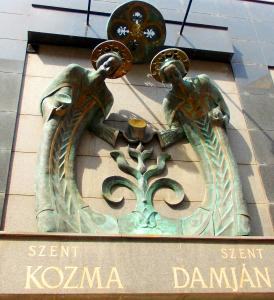
The first of November is the third of three different feast days dedicated to two twin brothers, Sts. Cosmas and Damian (the other dates being July 1 and October 17). As Holweck noted, though these three feasts are often suggested as representing three different pairs of twin brothers, the likelihood is that it is really the same pair being remembered and celebrated, with each feast day coming from a particular region or church. “This multiplication, however, is an obvious error, arising from various feasts celebrated in honor of the one pair in various churches.” [1]
What is interesting and significant about these brothers, other than being martyrs, is the way they lived their life, which is how and why they were famous. They were physicians who were interested in caring for and helping those in need. They gave their services out for free. For this reason, they are given the designation of Unmercenaries: instead of taking money for the sake of soldiering and killing others, they lived out their lives seeking to promote life, helping people live longer instead of dying an early death, without any expectation of any recompence. If someone they helped had money and was willing to pay them for their services, they would not accept it. They knew Christ had called them to love everyone, and this was the way they thought they could do it. The more they gave of themselves, the greater they became, and the more they could learn from Christ and follow out what Christ would have them do in the world.[2]
While the famous pair were martyred under Diocletian, it is their status as Unmercenaries which should serve as an example for us today.[3] Those who suggest no one would be interested in being a physician, that medical sciences would not advance, if medicine was not done with a mercenary attitude, find Sts. Cosmas and Damian as evidence to the contrary. While it is true, many people are selfish, it should not be difficult to understand why medical care will continue to improve without monetary incentives: we don’t like to get sick, we don’t like getting physical hurt, and we don’t like dying when it is not necessary. That is reason enough for medical science to continue creating new solutions to our health care needs. Indeed, looking to the history of medicine, hospitals developed long before capitalism turned medicine into a profit-making enterprise. Medicine was practiced, medical advances were made, because people, including the physicians themselves, wanted to be in good health. Hospitals developed out of Christian charity, and it was only later that secular forces saw a way to use them for monetary gain.
If we, then, can find a way to remove the profit motive out of the medical industry, it will not die out. The desire to live and thrive when it is possible will make sure health care will continue to create new medical advances. If profit is all that mattered, it is possible that many medical advances will be ignored because they are not profitable, for those who want to make money on the ill-health of others have reasons to make sure that such ill-health continues, while those who seek truly to help humanity and find cures for all its ailments will prefer to find real solutions even if they cannot be used to make money.
While many today certainly work in the medical industry with selfish, indeed avaricious motives, this is because society itself has promoted avarice as a good. It suggests money is the highest good. It has warped our sensibility so that we cannot think beyond such monetary concerns anymore. Money has become our greatest idol. Many people are willing to let others needlessly die because of it. The system requires the sacrifice of the poor and needy for it to continue, and the longer it lasts, the more it will need to sacrifice in order to stay in place. Christians should know avarice, the love of money, is said to be the root of all evil, and so promoting avarice as the foundation for an economic system and as the supreme motive for one’s livelihood, is as unchristian and idolatrous as one can get. “Therefore, for this very reason, Christians are worse because they should be better. They do not practice what they preach, and they struggle against the faith by their morals. All the more blameworthy is evil which the label of goodness accuses, and the holy name Is the crime of an unholy man.”[4] As many Christians have surrendered their hearts to this system, so they have become that much more monstrous, that much more evil than those who are not Christians who do not know better.
The Unmercenaries of Sts. Cosmas and Damian are so important to the Christian faith that they find their names mentioned in the Divine Liturgy in the East and the Western Canon of the Mass. They represent ideal physicians, those whose skills are employed for the good of others. To be sure, not all physicians will be heroic in their virtues. And as long as a barbaric capitalistic system is used to mete out medical care, those who study to become doctors have great expenses and burdens placed upon them, so it should not be said that they will follow Sts. Cosmas and Damian and entirely forgo fees. They should, however, desire for the system to change, and work for that change. Christians who go into medicine should consider how they can imitate Christ, the great healer, and how much they can work for others without the profit motive guiding them in their ways. In a capitalistic society, it might be extremely hard, if not impossible, for someone to be a physician without pay, but the extreme which we have seen capitalism push the profit motive in medicine is literally leading people to their deaths. Where capitalism guides the medical system, the system needs to change. Not only is a universal health care policy possible (even if it will take time and diligence to properly develop it), Christians should be at the forefront in its promotion, with Christian physicians speaking from the heart instead of from the profit motive. Like Sts. Cosmas and Damian, they should realize the example of the healing ministry of Christ should serve as the exemplar of what the medical profession should be like. Instead of fighting against reforms which help the poor and needy, Christians must make sure that the preferential option for the poor is at the forefront of social action. As the poor are the ones who suffer the most when medicine is a capitalistic industry, the capitalist industry with its presuppositions stand as being the antithesis of what a truly just and Christian system would be like. Sts. Cosmas and Damian knew this in their day. They gave their service to all – they gave free medical care to all.
Let is, then, consider the lessons of the Unmercenaries. The profit motive is not necessary for the practice of medicine. Once we truly grasp this, we can begin to change our way in thinking about medicine and truly engage the reforms necessary to make for a healthy society.
[1] F.G. Holweck, A Biographical Dictionary of the Saints (St. Louis: B. Herder Book Company, 1924; repr. Detroit: Omnigraphics, 1990), 240.
[2] St. Basil the Great suggests this is the way things work: “He wishes us to cling to our neighbors with embraces of charity like tendrils of a vine, and to rest upon them, so that keeping our desires always heavenward, we may, like certain climbing vines, reach the upmost heights of the loftiest teachings,” St. Basil the Great, “Hexaemeron” in Saint Basil: Exegetic Homilies. Trans. Agnes Clare Way, CDP (Washington, DC: CUA Press, 1963), 76.
[3] This is not to say their martyrdom is insignificant, but how many Christians truly are at risk of dying as martyrs?
[4] Salvian the Presbyter, “The Governance of God” in The Writings of Salvian the Presbyter. Trans. Jeremiah F. O’Sullivan (Washington, DC: CUA Press, 1962) 123.
Stay in touch! Like A Little Bit of Nothing on Facebook.
If you liked what you read, please consider sharing it with your friends and family!











